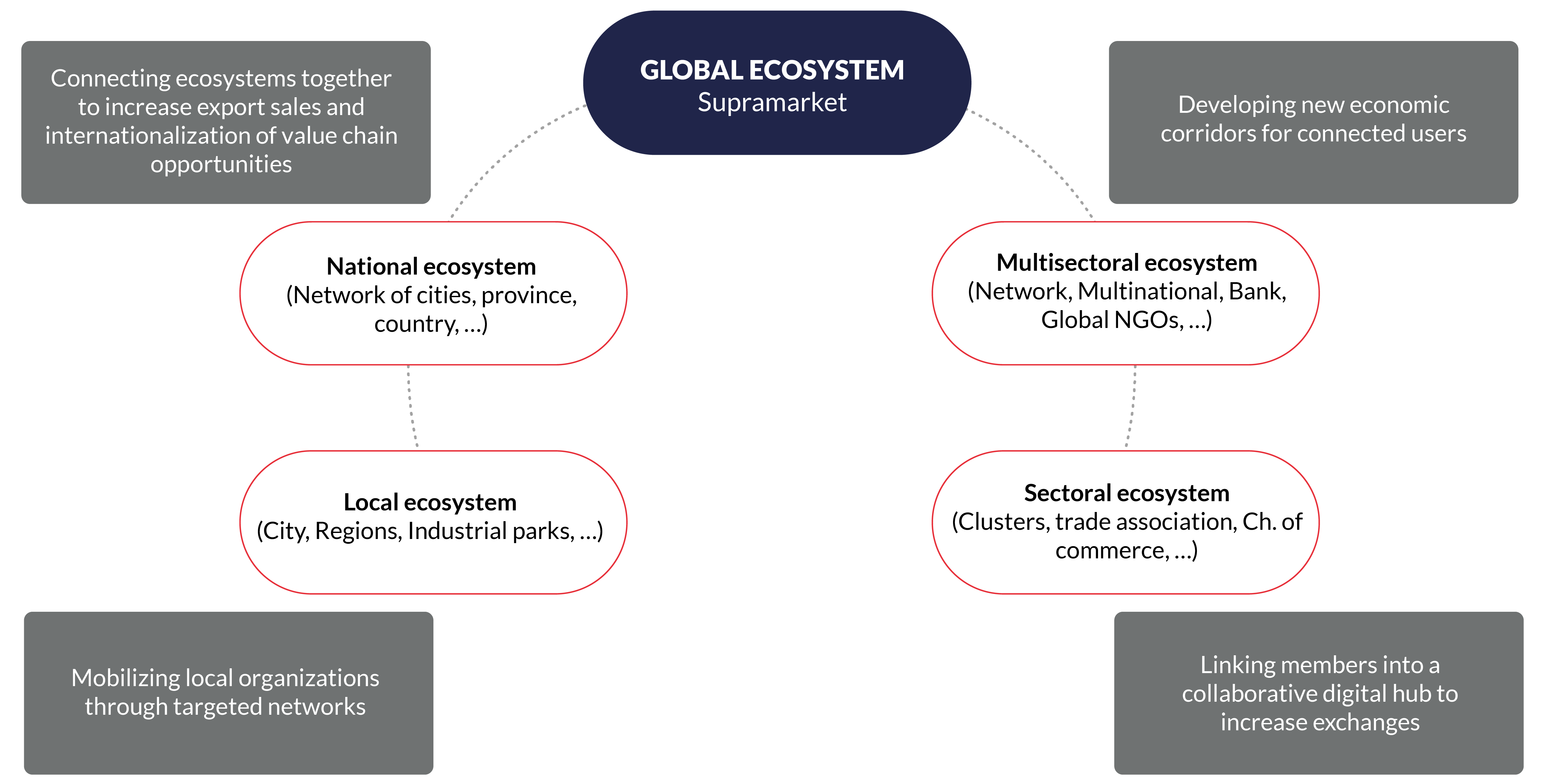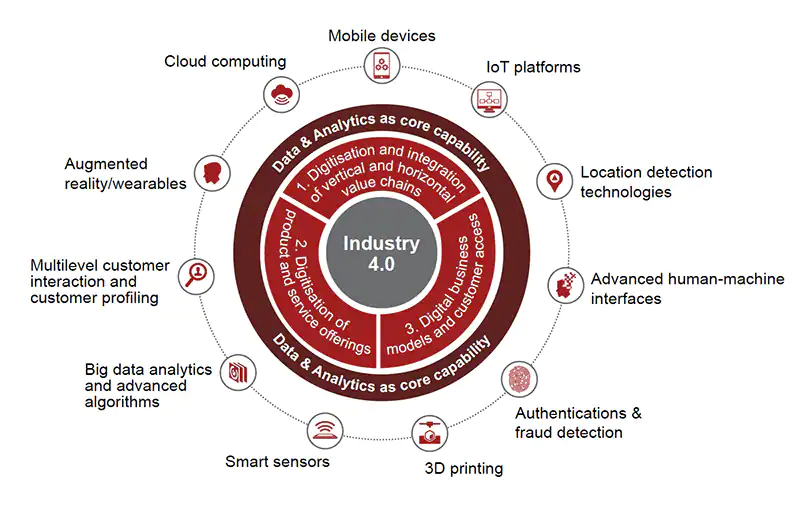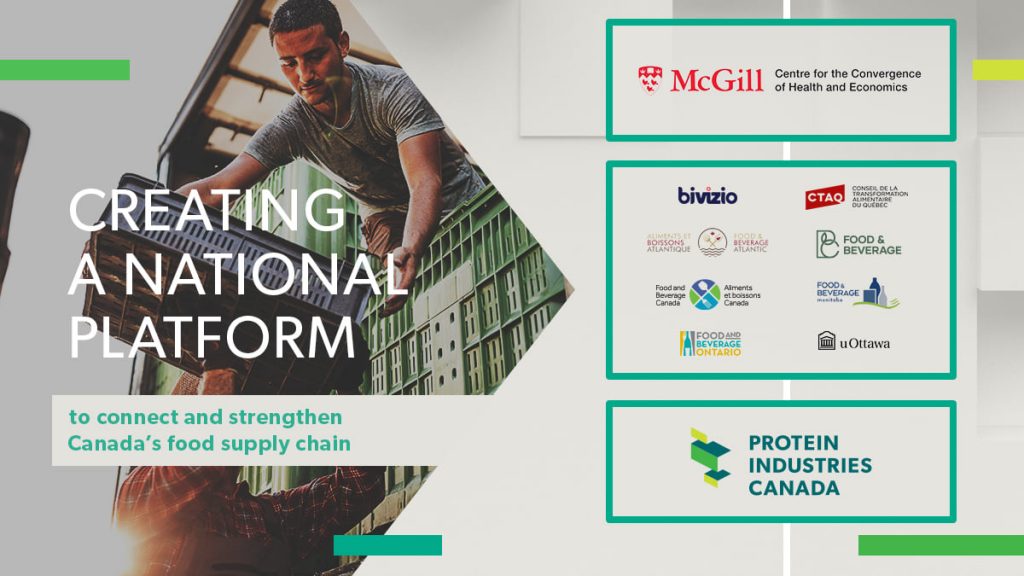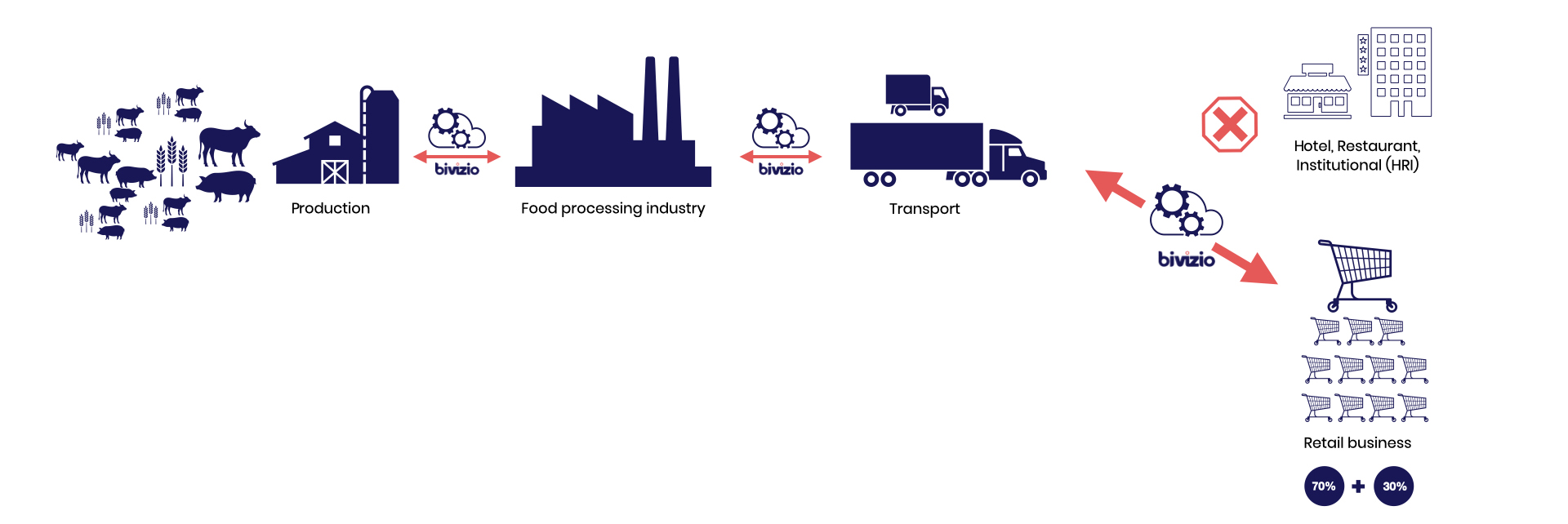Why Bivizio ?
Bivizio Platform
Fundamentals
The strategic foundations of the Bivizio platform accelerates market development, technological innovation, industrial competitiveness and operational efficiency of value chain and ecosystem members.
It allows SMEs and connected organizations to take the lead and improve their access to local, national and international markets by connecting them to new economic corridors with partner networks, cities and regions locally and globally by the creation of supramarkets.
Connect, Find, Cooperate, Trade and Exchange through our Glocal Marketplaces

Driving forces
Driving forces
Our solution is powered by advanced concepts of digitalization of value chains, products and services offerings as well as digital business models.
01
Digitization and integration of vertical and horizontal value chains
Our solutions support horizontal integration that stretches beyond the internal operations from suppliers to customers and all key value chain partners and ecosystem stakeholder.

Source: https://www.pwc.com/ca/en/industries/industry-4-0.html
02
Digitization of product and service offerings
By integrating new methods of data collection and analysis, companies can enhance their products, services and expertise visibility in addition to their strategic assets in order to improve their competitiveness and access to business partners.
03
Digital business models and customer access
Our digital products and services serve our customers with complete solutions in B2B and E2E (ecosystem to ecosystem) marketplaces in a distinct digital multisectoral platform supporting transitional pathways between ecosystems.
Source: PWC, Industry 4.0 White Paper
Value proposition
Value proposition
Our key value proposition is aligned with smart city 4.0
01
Datafication
Collecting enterprise data to foster cooperation, innovation and market access and to create ecosystem intelligence (BI to EI).
02
Industrial platform
Integrate actors from all sectors and associated expertise to support economic growth and supply chain resilience and agility.
03
Intelligentification
Matching intelligencification by digital tools, algorithms, intuitive classification and advance matchmaking and collaborative capacities.
04
Industrial innovation
Our convergence innovation platform increase collaboration, facilitate partnership building and strategic equipment and resources access.
Source: Daegu Smart City Congress 2019
Our ecosystem expertise
Bivizio Platform
Our ecosystem expertise
Bivizio’s unique value proposition is based on its multi-sector digital ecosystem and its glocal convergence platform which allows industrial, commercial, institutional, social, community, academic and governmental organizations to be interconnected.
The platform also makes it possible to establish trade and digital exchange corridors between networks in order to improve their level of integration as well as increase their interactions, their interoperability as well as the transition of knowledge, products and expertise from one ecosystem to another.
Our data mining capacity is based on an 8-digit classification system already covering more than 67 sectors:
+19,000 categories
Additional classification for specific materials and types of waste of more than 4000 categories available on Cirkull Marketplace.
- Aerospace & Defense
- Agriculture
- Apparel
- Automotive
- Biopharma
- Business Services
- Coal Mining
- Communication
- Construction
- Distribution & eCommerce
- Downstream Chemicals
- Downstream Metals
- Education
- Electric Power
- Environmental Services
- Business Services
- Fishing
- Oil & Gas
- Paper & Packaging
- Performing Arts
- Plastics
- Printing
- Production Technology
- Recreational Goods
- Textiles
- Tobacco
- Trailers & Appliances
- Transportation
- Upstream Chemicals
- Medical Devices
- Upstream Production
- Vulcanized Materials
- Water Transport
- Wood Products
- Food Processing
- Footwear
- Forestry
- Furniture
- Hospitality
- IT
- Insurance
- Jewelry
- Leather Products
- Lighting
- Livestock
- Marketing
- Medical Devices
- Metal Mining
- Metalworking
- Music
- Nonmetal Mining
- Commercial Services
- Community Services
- Education
- Entertainment
- Financial Services
- Food & Beverage
- Health Services
- Hospitality
- Household Goods
- Industrial Products
- Logistics
- Motor Vehicles
- Personal Services
- Real Estate
- Retail
- Utilites
Flagship Project
Flagship Project
FCI-Canada Project:
Industry and academia team up to secure Canada’s food supply

The FCI-Canada Project focuses on creating a national, sector-wide platform with enterprise-to-enterprise connectivity capabilities, which will help strengthen Canada’s domestic food supply chain. Linking food and beverage companies across the country, the project will make it easier to recover from COVID-19 and other emerging issues, as well as diversify Canada’s plant-based food, feed and ingredients offerings through collaborative partnerships.
Canada’s leading food and beverage associations will build provincial and regional databases that will then be connected into a national network. This project builds on Conseil de la Transformation Alimentaire du Québec (CTAQ)’s existing Systeme Numerique Alimentaire Collaboratif (SNAC) collaboration platform, developed by Bivizio and currently in use in Quebec, as well as data science work conducted at the University of Ottawa. In its evolution to FCI-Canada, the national platform will help companies from across Canada make connections across the value chain by allowing them to post and search for specific products, services and partners within given geographic parameters. The FCI-Canada platform will also evolve to be responsive to supply chain disruptions such as those associated with COVID-19. Expanding its functionality across the country will mean better responsiveness across the national supply chain and will help ensure the security of Canada’s food system.
“Canada’s Protein Industries Supercluster is bringing together companies of all sizes and academic institutions to create new possibilities for innovation and collaboration and promote bold new ideas in the agri-food sector. Through this project, the Supercluster is bringing together partners from all across the country to find innovative solutions to today’s challenges and make our food and beverage supply chain stronger and safer. "
“Canada is at the forefront of agricultural innovation, and to stay ahead of the curve we must continue to invest and collaborate. The Protein Industries Supercluster launched by our Government in 2018 has been a made-in-Canada success story of dynamic new partnerships and innovations in agriculture. This project is yet another example of how the Protein Industries Supercluster is creating exciting new opportunities for producers and agri-food entrepreneurs that respond to emerging consumer demands.”
“Improving our sector’s ability to both innovate and respond to emerging issues requires a collaborative, innovative solution in and of itself. This digital platform (Bivizio) will help connect the value chain across the country, from ingredient processors in the east, to food manufacturers on the west coast. And better yet, it will do so in a way that will improve the lives of Canadians, thanks to its ability to further strengthen our domestic supply chain and increase the selection of food products available across the country."
“We believe this project demonstrates the value of Canadian industry partners working together toward a common goal – ensuring the strength and the resilience of Canada’s food sector. This platform, which will serve the interests of Canada’s food and beverage manufacturing sector from coast to coast, confirms the value of the provincial associations forming Food and Beverage Canada."
“This project will provide Canada’s critical food and beverage manufacturers with the ability to connect to customers and suppliers across the country. In Atlantic Canada, we recognize that greater connectivity will lead to a stronger and more efficient food and beverage sector.”
“The COVID-19 pandemic did more than reveal weaknesses in our healthcare system, it also exposed the fragility of Canada’s ability to feed itself. This project demonstrates the value of academia working together and with industry to impact a precious, but all too often taken for granted, resource: the food we eat.”
Use-case
Regular food supply chain
Normal situation

Pandemic situation

Pandemic situation + Bivizio

Questions?
Interested in discussing how our digital platform, functionalities and services can support the growth of your ecosystem?
